| By Thomas Brett |
Introduction To The Series:
Learning How To Learn is one of the most crucial steps you can take towards becoming great at pretty much anything – And what better place to learn than from the minds of people who have actually been doing the job successfully for years?
In this ongoing series of Blogs, we’ll explore the valuable words of wisdom bestowed upon us by some of the most sought after names in the recording studio business, and discover how you can apply this advice to your own situation.
This week, we’re examining one of Nashville’s finest music men: Jacquire King
NOTE: If you’re hoping to find some “secret mix settings” or “magic formulas” in this article then you might as well leave now… I can guarantee you that the real secrets behind each of these engineers’ success are their ears and personal tastes.
Remember:
Following the practical “workflow and decision-making” advice these guys have to offer from years of experience in the business is far more valuable than trying to copy the settings they’ve used for specific songs!
VOLUME 5: Jacquire King
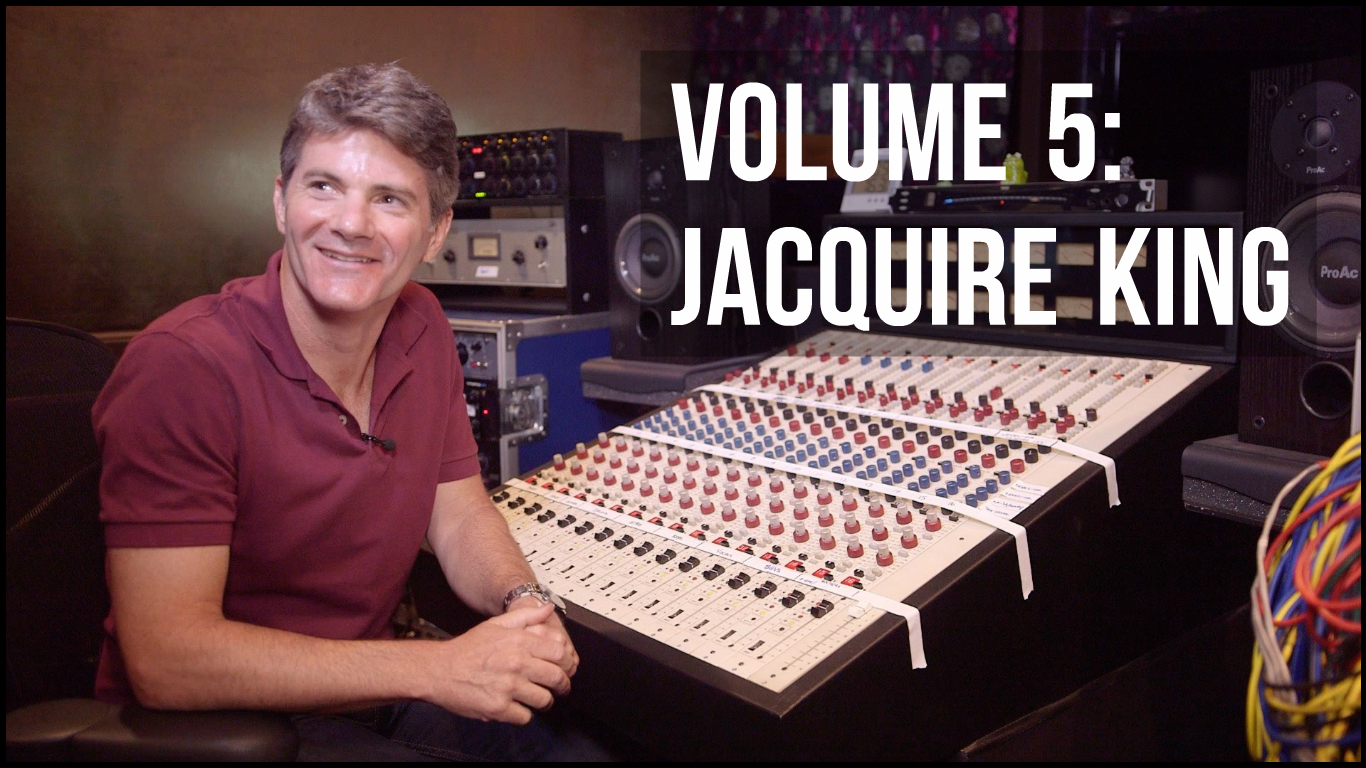
Who Is Jacquire King?
Jacquire King is a Nashville-based, Multi-Grammy-Award-Winning Engineer & Producer responsible for some of the most commercially successful rock albums of the 2000s.
Some of the select artists he’s worked with include:
Kings Of Leon
James Bay
You Me At Six
Norah Jones
Mutemath
Billy Talent
Modest Mouse
AND MANY MORE…
Now that you know exactly who you’re dealing with, let’s cut straight to the chase…
Here Are 5 Pieces Of Incredible Audio Advice From Jacquire King:
1 – Simplify The Mixing Process From The Get-Go
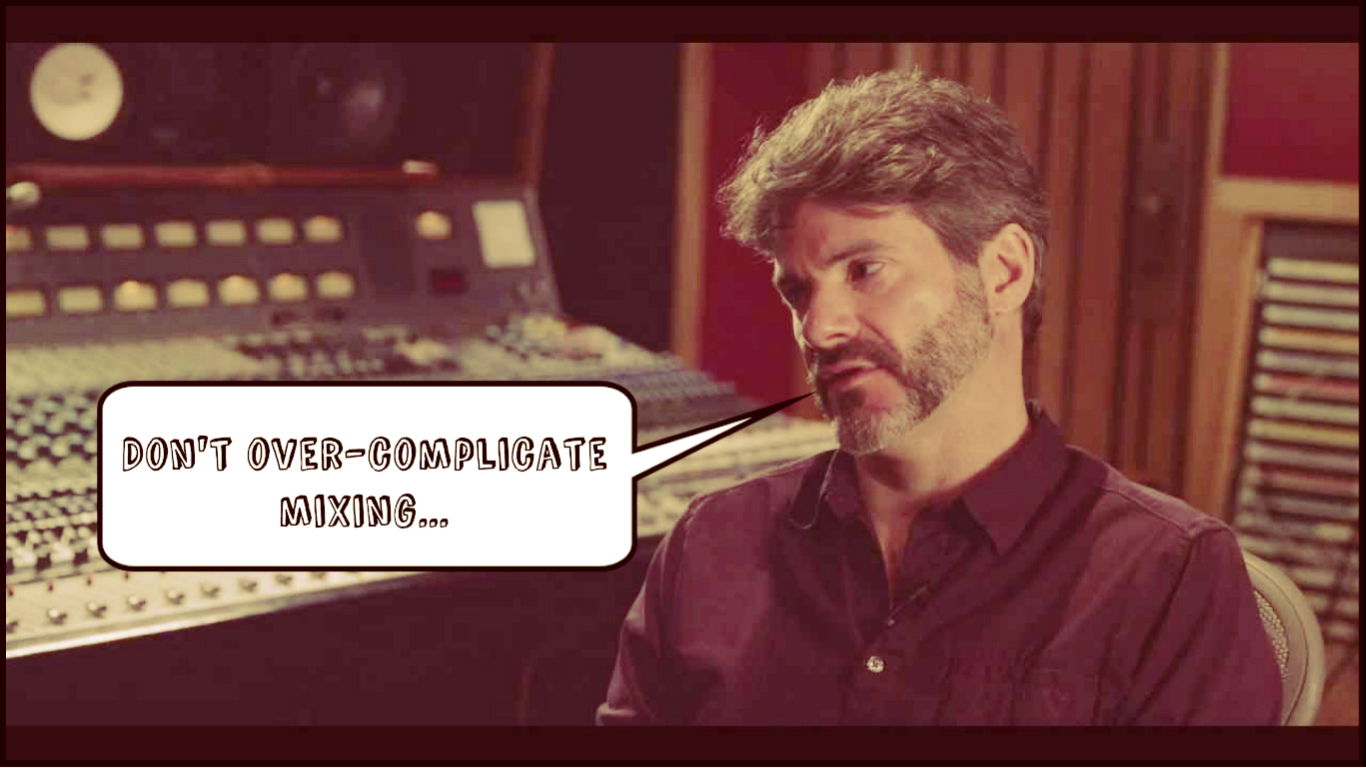
“I try and record a finished sound as much as possible. When I listen to the tracks I want to be able to just push the faders up and make a balance and for it to sound like a record. I just want to hear it close (to the final sound), so that the mixing stage is just about accentuating things. It’s important to make the decisions along the way and not to wait til the end to properly EQ and Compress things, because if you haven’t been listening to the elements treated that way as you accumulate more parts, then you’re not going to have the sonic space to make everything fit.” – Jacquire King
Record As If The Mixing Process Doesn’t Exist!
- One of the biggest changes between when I first started working in audio and present-day is the way I weigh the importance of recording vs. mixing.
- Earlier on in my career, I’d idolise the mixing process and approach everything with an “I can probably fix it in the mix” attitude. The problem is, my lack of experience at the time meant that I didn’t really know how to go about “fixing” my recordings, which resulted in some pretty drastic (and stupid) mixing decisions…
- The fact that I was constantly over-doing things and ending up with really unnatural sounding results meant that I was never happy with my sounds, and in return, never willing to release any of the music I’d produced.
- Over the course of the next few years, I started to notice a pattern in a lot the professional mixing tutorials and articles I studied: More often than not, the raw sounds they had to work with were already incredible, and they weren’t going anywhere near the amount of subtractive EQ which I’d been using…
- The biggest difference between between my raw material and theirs? They were getting each instrument right at the source and making tonal decisions early on based on the way they intended the end product to sound.
- Coming to this realisation led to a gradual shift in the way I prioritised each step of the production process.
- Through choosing to focus my efforts towards learning how to capture “close-to-finished” recordings and reducing the amount of after-the-fact processing I was applying, I was able to obtain sounds that I was much happier with.
Conclusion: You can’t record something that sounds nothing like your references or the sounds in your head and expect to magically transform it during the mixing stage. Always try to record with the intention of the raw sounds making the final cut. I guarantee that you’ll have a lot less to worry about later on.
NOTE: Want to learn how to record like a real pro? Check out Eyal Levi’s “Metal Recording Bootcamp” on CreativeLive.
2 – Can You Mix Your Own Music?
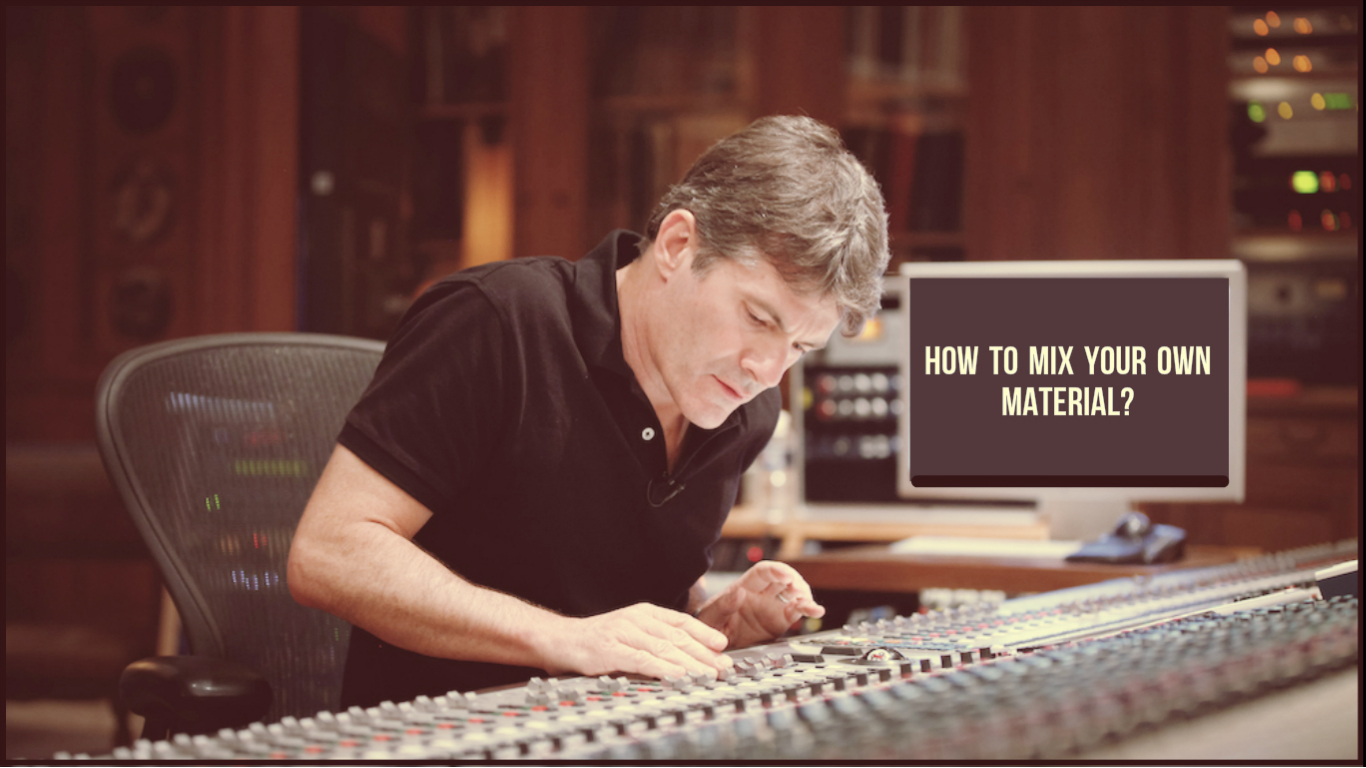
“It can be very difficult to mix your own stuff because you’ve spent so much time with it. It definitely feels easier to mix somebody else’s material because you don’t really have the same relationship with the music.”
“You definitely have to guard against overdoing it during the mix process or thinking that mixing always has to be a big elaborate thing. Sometimes it’s very simple and you just need to change the balance a bit, add a little bit of compression and tweak the EQ and it’s done… One thing that helps is to keep rough mixes and reference them while you’re mixing to make sure you’re doing the right thing.” – Jacquire King
Mixing Your Own Stuff: DIY or Outsource?
- It’s often said that you shouldn’t mix your own material due to the lack of perspective that tends to come alongside spending long periods of time working on one thing. Although there is definite validity in this viewpoint… There are also a huge number of benefits to personally finalising your music.
- Learning how to mix early on in your career as a musician means that you can work on improving your studio skills and musical skills hand-in-hand as you progress.
- Take a guy like Nolly from Periphery for instance; the fact that he’s able to play, record and mix his own material to very high standards gives him the ability to pursue his creative goals to their maximum potential.
NOTE: I’d highly recommend going back and watching Nolly’s NailTheMix content for a prime example of somebody mixing themselves to great effect:
https://urm.academy/nolly-periphery-dials-bass-tone/
- Another primary benefit of DIY is the fact that paying other people to record and mix for you can really add up in the long run. I can’t tell you how awesome it is to have all the resources at your disposal to be able to work on music whenever you want without time restraints or budget limits!
- Now that I’ve expressed a few of my overall views on DIY mixing: The main point Jacquire is making in his quote is the fact that just because the mixing process exists as a separate entity to recording doesn’t mean that it has to be a drastic and elaborate process.
Conclusion: If you’ve already been recording each instrument with particular goals in mind, and you’re content with the way something is sounding, you don’t have to apply a huge amount of processing to it just for the sake of having a defined “mixing stage”.
3 – Get Your Mixing Priorities Straight
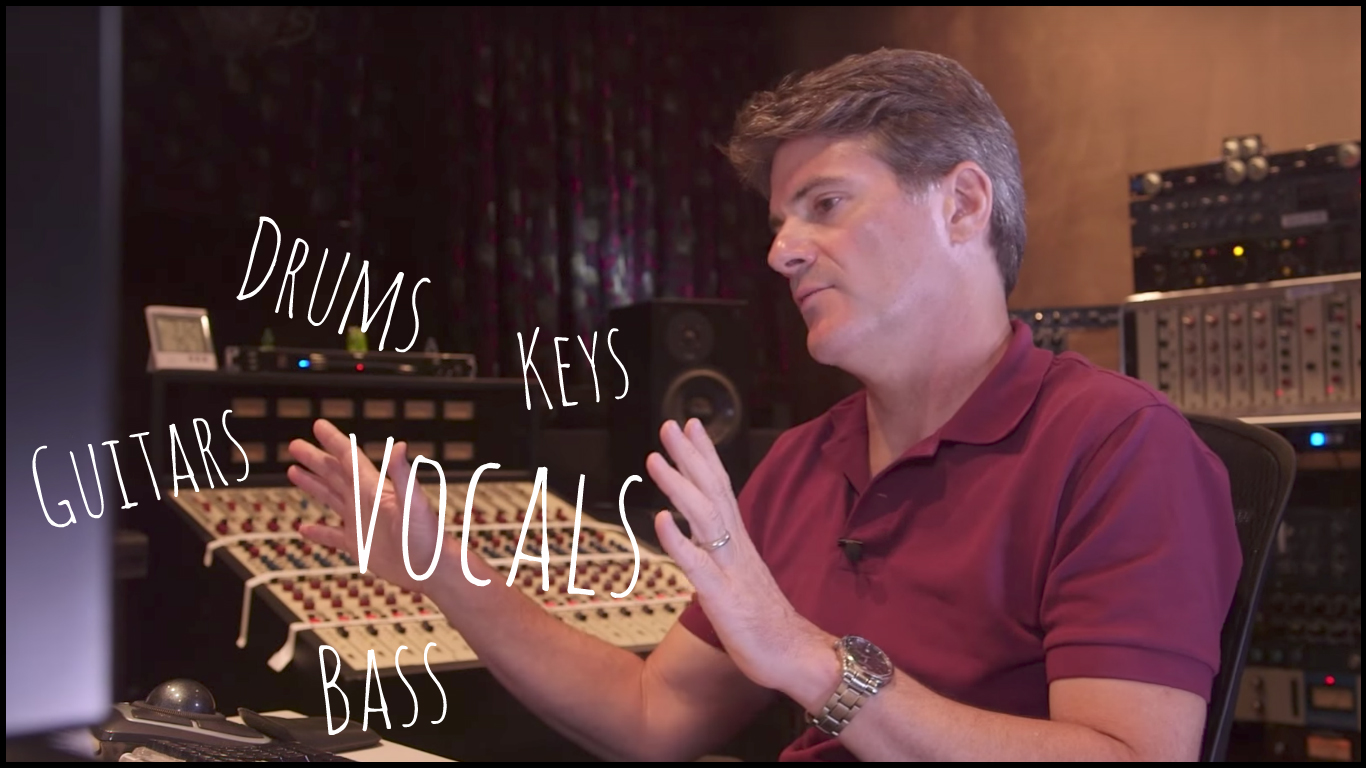
“If I just start with all the instruments and leave the vocals till last, I might end up trying to get too much participation or energy out of something like the guitars. Not that they aren’t important, but I might make them too loud, too big or too wide in the stereo field and take up too much of the center. Remember that the vocal is the thing that’s in the middle and it’s really important, so you need it in there in order to understand how to use the other instruments and how to EQ. Not only is a voice difficult to record and capture, but you’ve got to make sure you’re not using up frequencies in a mix where you need to make the voice sit.” – Jacquire King
Structure Your Mixing Workflow!
- The order in which you decide to mix each instrument can make a significant difference towards the quality of the final mix you produce.
- In most genres of music, the vocal is the center of attention and has the most impact on the success or failure of a track. If you’re focusing on building a “huge” instrumental mix for too long while neglecting the vocals until the very end of the process… How can you expect to make them fit comfortably?
- You don’t necessarily have to start out by mixing the vocals first, but adding them into the picture as soon as you’ve got a basic instrumental backbone going and processing everything in context will go a long way towards keeping them at the forefront of your decision making (and your final mix).
NOTE: Want some in-depth tips on treating Vocals in a mix? Check out my “Mixing Secrets Volume 1: Vocals” URM Article from a few months back.
Conclusion: Mixing is called “Mix-ing” for a reason! There’s no point in working on individual elements in isolation as the only thing that matters is how they interact with the other elements. Make sure you’re prioritising the right elements of the track and not spending too much time working on miniscule details that most people won’t even notice…
4 – Distortion Is Your Friend
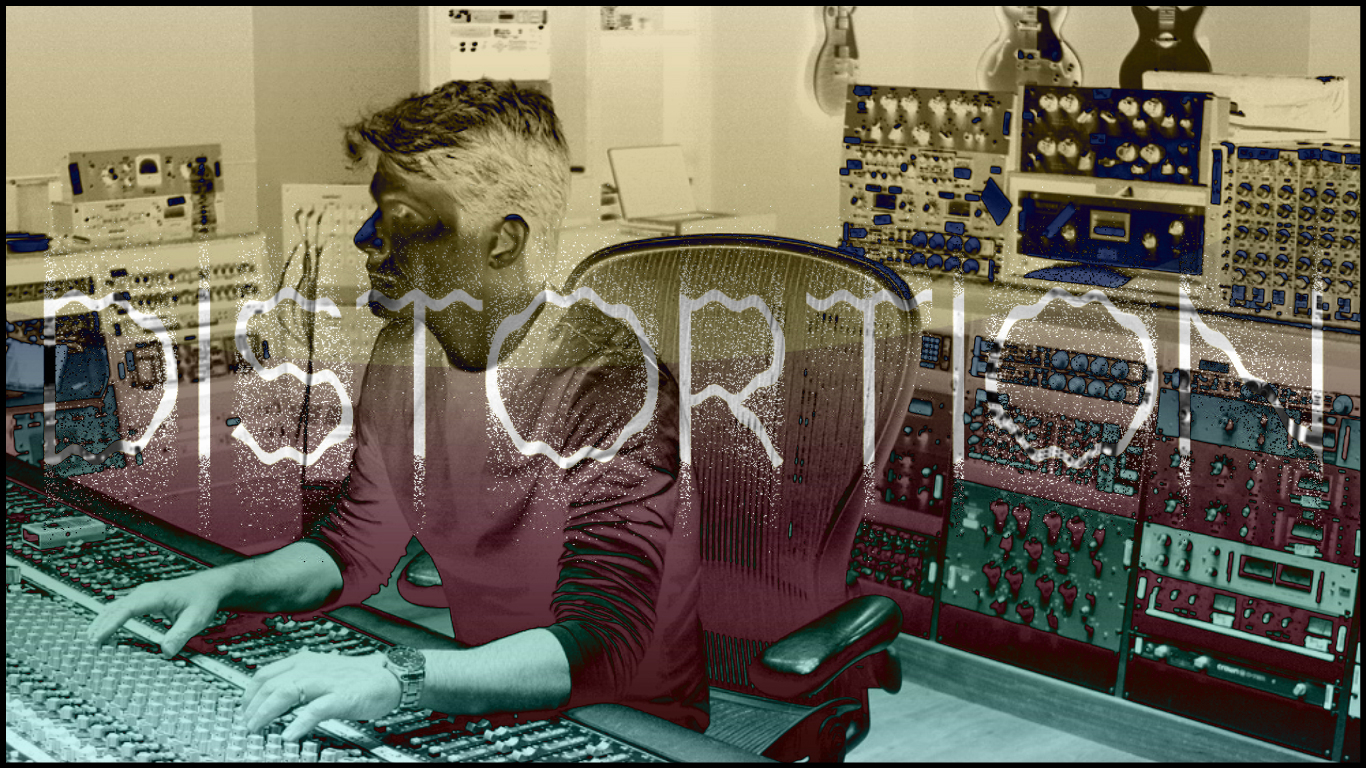
“There’s good distortion and there’s bad distortion. I love distortion on pretty much everything to some degree. We’re able to record so clean now with going to digital and you just get back the sound that you put in. With analog, we were recording to the format and optimizing our input accordingly knowing that it would change a little. For example: Motown probably benefitted from the fact that some of the gear was mismatched, but they made it work and it resulted in a unique palette of harmonics.” – Jacquire King
Digital Is Clean… Dirty It Up A Bit!
- People often talk about the sonic differences between analog gear and modern digital technology and how “ye old vintage equipment” had a certain “magic” that is hard to find in the world of recording nowadays.
- The truth is… Most of the “magic” that these old timers are reminiscing about was owed to the subtle distortion or “saturation” characteristics introduced into the signals via tubes and reels of tape.
- The use of some tasteful harmonic colouration to fatten or liven up certain “lifeless” elements within a mix is one of the most effective methods to forging impactful mixes along the lines of Jacquire.
- An important thing to remember is that you don’t have to add much for it to add up to a significant improvement in the way things sit and feel!
- Often mixing this type of effect in under the original signal in parallel is the best way to maintain the original transient detail of the raw signal while simultaneously blending in some solid “thickness”.
NOTE: Check out my “Making Digital Sound Analog” URM Article for more info on the differences between Analog and Digital, as well as some useful tips on achieving “Analog-esque” results in-the-box.
5 – Conclusion: The Role Of A Producer
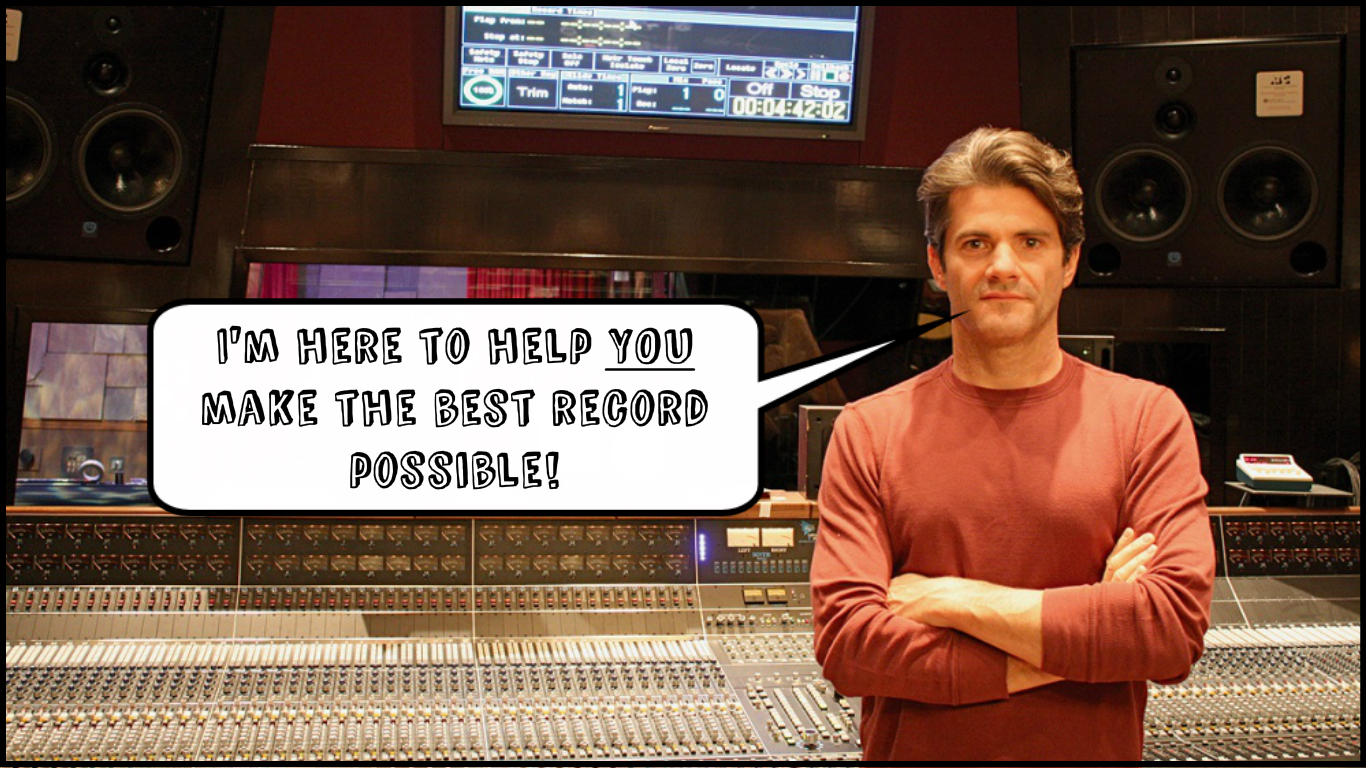
“The way I approach making records is that I treat each one differently. I’m very collaborative and feel like a co-creator, I’m not here to make my record, I’m here to make the band’s record. You need to let them be themselves and just try to help them see how to do it at their best by just being a voice of reason or even devil’s advocate sometimes. Basically, just placing them in an environment where there’s an opportunity to make a great record.” – Jacquire King
It’s Not Your Record, Swallow Your Ego!
- As a producer, it’s often difficult to draw the line between helping an artist or band make a record that represents them accurately, and simply taking over.
- Producing with the expectation that everybody will “realise your creative genius” in mind probably isn’t the right way to go about the process, and believe it or not, people can usually sense if your interactions with them are genuine or not. (And if you truly have their best interests in mind...)
- Instead, try to approach each project with the intention of accentuating and capturing the positive attributes of the people you’re working with while helping them fulfil their creative visions to the fullest.
NOTE: For more tips on interacting with musicians as a producer for better results, check out my “5 Recording Tips” URM series.
CONCLUSION:
Remember: It’s awesome when your contributions are appreciated, but it’s not a given. My advice is to simply do the best job you can possibly do on a situation-by-situation basis and not to let your personal agendas get in the way of relationships.
Happy customers that feel valued will spread the word and likely want to continue working with you!
Final Words:
This concludes “Learn From The Legends – Volume 5: Jacquire King.” I hope that this article has given you some new ideas to try out during your next project. Be sure to comment below if any of this information has helped you out, or if you have any questions.
Stay tuned for more production/mixing related articles in the not-so-distant future!
Thomas Brett is a producer, mixing engineer and songwriter at Brett Brothers recording studio in the UK. Check out the Brett Brothers studio website for more information and articles on all things mixing www.brettbrothersstudio.com
Read Learn From The Legends – Volume 1: Chris Lord-Alge here!
Read Learn From The Legends – Volume 2: Randy Staub here!
Read Learn From The Legends – Volume 3: Andy Wallace here!
Read Learn From The Legends – Volume 4: Andrew Scheps here!
Want mix tips from Thomas Brett? Read them here!
 Nail The Mix is our online mixing school that gives you REAL multi-tracks from REAL bands, plus a mixing class from the producer who recorded it. Past guests include Periphery, Chelsea Grin, Machine Head and State Champs. Join now for instant access!
Nail The Mix is our online mixing school that gives you REAL multi-tracks from REAL bands, plus a mixing class from the producer who recorded it. Past guests include Periphery, Chelsea Grin, Machine Head and State Champs. Join now for instant access!

One thought on “Learn From The Legends – Volume 5: Jacquire King”